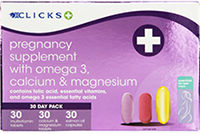With all the new sensations pregnancy brings, how do you know when a midnight call to your doctor, midwife or maternity unit is warranted? It’s always better to err on the side of caution. And if you experience any of these signs, call straightaway.
1. A pain in your lower belly
Some aches are a normal part of your muscles and ligaments stretching as your baby grows, or are the result of indigestion, heartburn or a tummy bug. "But a severe or constant pain on one or both sides of your lower belly can signal an ectopic pregnancy (where the foetus grows outside your womb), miscarriage, or placental abruption (where the placenta separates from your womb lining), especially in the second and third trimester," says Dr Krishna Lalloo, a gynaecologist and obstetrician in Gauteng.
2. Middle or upper belly pain after your 20th week
It may just be gastritis and acid reflux, Dr Lalloo says, but can also be a sign of pre-eclampsia – pregnancy-induced high blood pressure (hypertension), which decreases the blood flow to your baby and can cause you health problems too.
Other pre-eclampsia signs are swollen feet and hands, sudden weight gain (more than 2kg a week), severe headache, vision problems, dizziness and vomiting.
3. A high fever
A fever above 39°C, without cold or flu symptoms, and lasting more than 30 hours can signal an infection, virus or other condition that could harm your baby. The persistent high temperature may also result in premature labour.
4. Vaginal bleeding
A little very light bleeding or spotting can simply be breakthrough bleeding (bleeding from the uterus) triggered by the hormones that control your menstrual cycle pre-pregnancy, or by having sex (your cervix can be more sensitive in pregnancy and bleed). "But call your doctor anyway, because bleeding can also be a sign of an ectopic pregnancy, miscarriage, placental abruption, or premature labour," says Dr Lalloo.
5. Vaginal leaking
"Leaking can result from excessive vaginal discharge, which can be normal in pregnancy," Dr Lalloo says. However, fluid coming from your vagina can also mean your waters have ruptured, which could signal early labour, and leave you and the baby susceptible to infection.
6. Intense thirst
It’s important to drink more water when you’re pregnant, and if in spite of doing this you have extreme thirst, it may signal gestational diabetes, which can increase the risk of complications for your baby and for you.
7. A burning sensation when you urinate
This can be the sign of a urinary tract infection (UTI), especially if you want to pee often, the pee is cloudy or smelly, and you feel tired, achy or nauseous. Untreated, it can lead to kidney infection (pyelonephritis), which can cause early labour and low birth weight.
8. A pain in your leg
Leg cramps are fairly common in pregnancy, but if the symptom is in just one leg, and the area is red, swollen and hot to touch, it can signal a deep vein thrombosis (DVT). "Pregnancy increases your risk for this by eight times," says Dr Lalloo, "as hormonal changes make your blood more prone to clotting, and the pressure of your expanding womb can slow circulation and lead to blood pooling in your legs and feet."
9. Severe itchiness
Some itching is normal as your skin stretches or if it's dry, but if you itch intensely all over, especially at night, and especially on your palms and the soles of your feet, it can be a sign of obstetric cholestasis (fatty liver) – a condition that may result in jaundice and premature labour, even stillbirth.
10. Prolonged stillness
Babies usually start moving (‘quickening’) after about 25 weeks, and it’s normal for them to have quiet times if they’re sleeping or you haven’t had anything to eat (lowering their energy). But prolonged stillness can be a sign of oligohydramnios – reduced amniotic fluid. This may be caused by a rupture in the amniotic sac, or by the placenta not working as it should, or a defect in baby’s kidneys or bladder.
After week 38, there’s also a danger of compression of the umbilical cord, which the fluid cushions. "Call your doctor straight away, or at least go into the labour ward for a check-up if this happens," says Dr Lalloo.
How Clicks Clinics can help you
All Clicks Clinics offer a pregnancy consultation which includes a blood pressure test, a measurement of your BMI and advice on pregnancy-related issues.
Don't hesitate to make an appointment at a Clicks Clinic: call 0860 254 257 or book online at Clicks Clinics online.
IMAGE CREDIT: 123rf.com
FEATURED PRODUCT: Clicks Pregnancy Supplement
Make use of the convenience of online shopping to purchase the trustworthy all-in-one Clicks Pregnancy Supplement for use before, during and after pregnancy.


